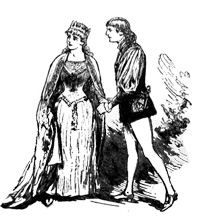Gilbert & Sullivan Revised
The members of the Gilbert & Sullivan Very Light Opera Company have a tremendous respect and appreciation for the works of Gilbert and Sullivan. We even refer to their body of work as “The Canon!”
That is why many of us find it disappointing when we see a Gilbert and Sullivan production in which the words and even the music have been changed. It often seems that the changes were made either in order to simplify the works, on the assumption that Gilbert and Sullivan’s operettas are too complex or erudite for modern audiences or because the director or others responsible for the production believed that they were better librettists than Gilbert or more talented composers than Sullivan! They are, of course, almost always wrong … very wrong!
The members of the Gilbert & Sullivan Very Light Opera Company believe that the works of Gilbert and Sullivan can and should stand on their own. We respect our audience and see no need to “dumb down” the operettas for them. In addition, none of us are under the delusion that we are wittier than Gilbert or more brilliant than Sullivan and feel no need to rewrite the operettas simply to demonstrate how clever we are!
We do believe, however, that there are situations in which revisions to Gilbert and Sullivan’s works may be appropriate or are actually necessary.
The first situation in which revisions may be appropriate is when there is an established tradition of changing Gilbert’s words of a song to make it more topical. One of the best examples of this would be the tradition of writing more current lyrics to Ko-Ko’s, “I’ve Got a Little List” song in The Mikado.
The second situation in which revisions may be appropriate is to restore something that was original to the work, but which was later changed, when there is a reasonable belief that the restoration will make the operetta a better piece. Examples of this would be restoring the Major General’s song as the original Act II Finale for The Pirates of Penzance, adding a second verse to “The Soldiers of Our Queen” in Patience or restoring “When a Man Has Been a Naughty Baronet” to the Act II finale of Ruddigore.
A third situation is one in which revisions have actually become necessary. This is when Gilbert’s nineteenth century, Victorian sensibilities are significantly at odds with our modern sensibilities. Overall, we grant Gilbert a great deal of latitude, understanding that his occasional problematic representations are an acceptable reflection of the world of his day. An example of this would be Lord Mountararat’s chauvinistic pronouncement in Iolanthe, “This comes of women interfering in politics,” which may have been a matter-of-fact statement in Gilbert’s day, but now is heard as comic and always draws good natured “boos and hisses” from modern audiences. There are, however, other situations in which revisions are essential due to an aspect of Gilbert’s works which was acceptable in his day, but is now unacceptable to modern audiences. A longstanding example of this would be the practice of eliminating a particularly offensive racial reference that Gilbert uses in both Princess Ida and The Mikado. The need for a more comprehensive revision is the case for The Mikado, with the racist implications of most productions being staged with a predominately Caucasian cast made up to appear Asian or in “yellowface.” The same principal applies to Utopia, Limited and the inappropriateness of a majority of the predominately Caucasian cast made up to appear as Polynesians. As a socially conscious, progressive arts organization, the Gilbert & Sullivan Very Light Opera Company has chosen to respond to this concern, as is detailed in the revision pages for these two operettas.
The fourth and final situation in which revisions are necessary is when a company decides to produce Princess Ida, Utopia, Limited or The Grand Duke. The issues with Princess Ida are minimal and are primarily in regards to the operetta’s development of a relationship between Ida and Hilarion, and the poorly written, perfunctory concluding dialogue. The structural issues with Utopia, Limited and The Grand Duke, however, are much more significant.
Many years ago, the Gilbert and Sullivan Very Light Opera Company decided that it wanted to perform Gilbert and Sullivan’s final two operettas. In their original forms, however, these two operettas are all but impossible to stage as legitimately entertaining pieces. The dialogue in both is overwritten, they include some poor music, they contain unfinished plot lines and both are simply too long. In order to produce the successfully, our company understood that it was necessary for both operettas to be substantially edited, rewritten and revised. We did so with both operettas, on two separate occasions, and subsequently staged very successful productions.
We invite you to use our revisions to Princess Ida and our fully revised versions of Utopia, Limited and The Grand Duke, if you are considering producing one of those works. As it was for us, we believe that you would find producing these operettas, as revised, to be a delightful experience for both your audience and your company.
The following pages include the most significant revisions that we have made and staged in our productions or will do so in the future. We invite you to review them and welcome you to adopt them for your own Gilbert and Sullivan productions, if you would like to do so.
“The pain that is all but a pleasure will change for the pleasure that’s all but pain”
Patience
